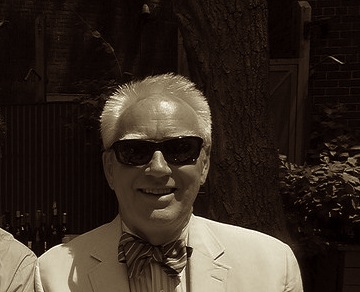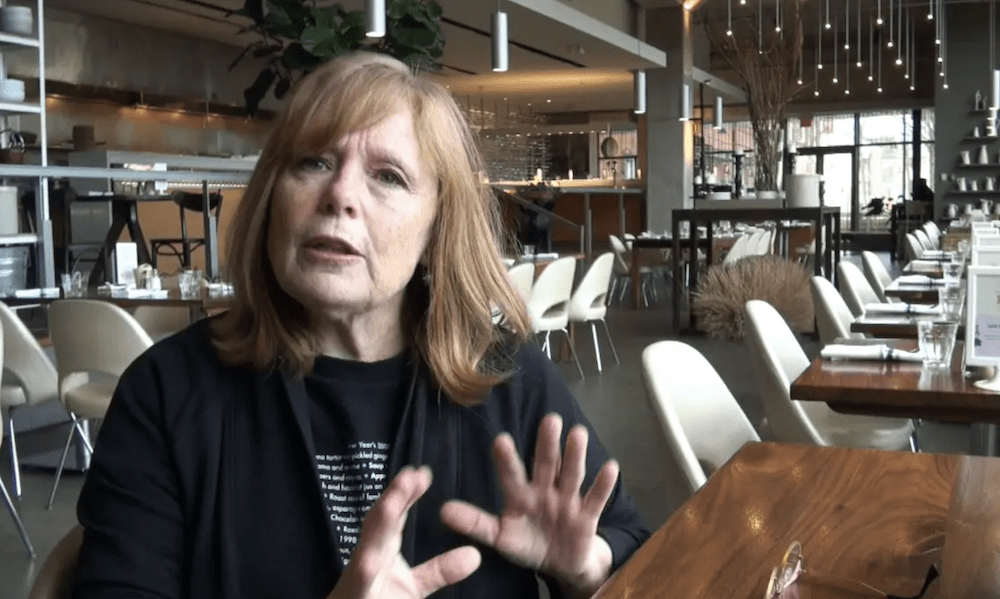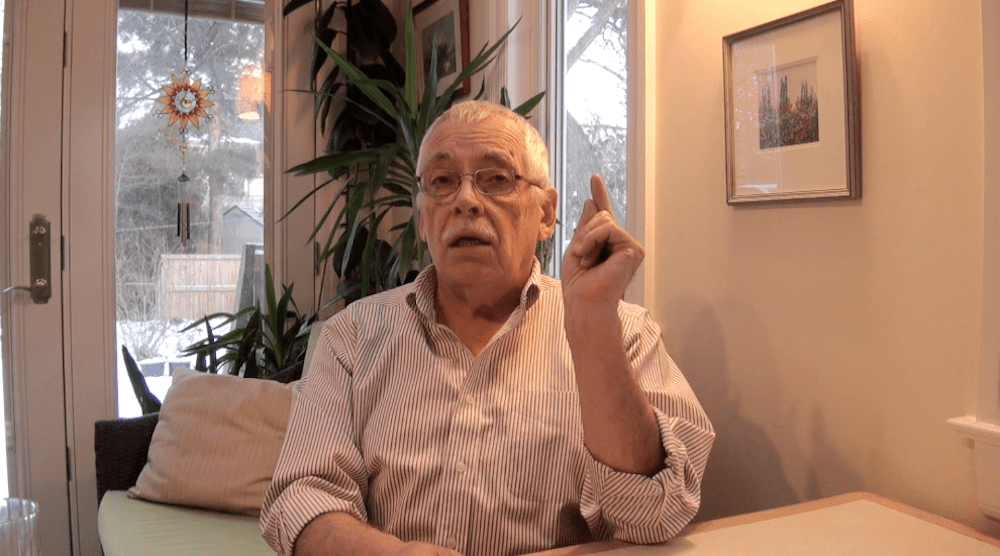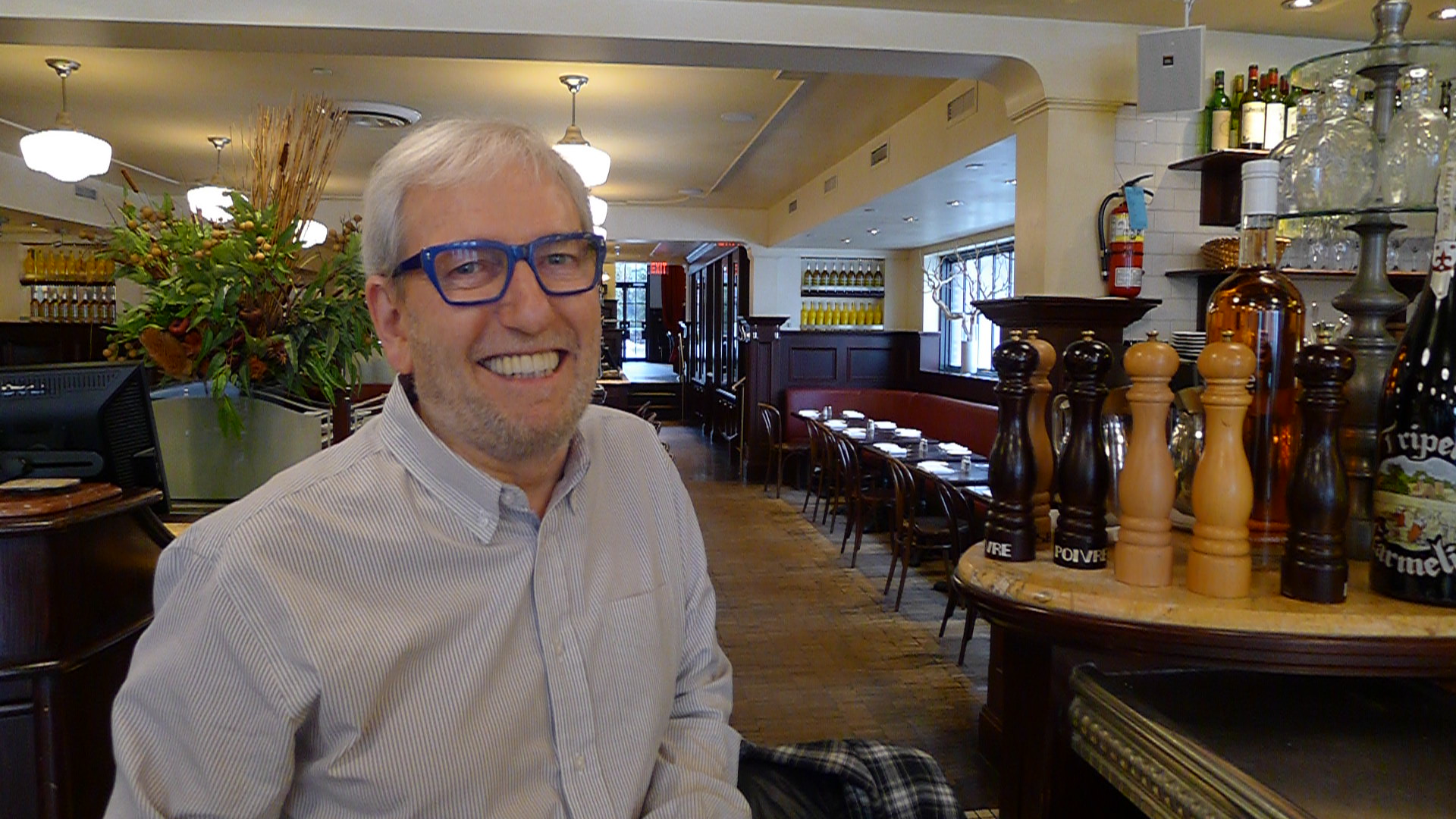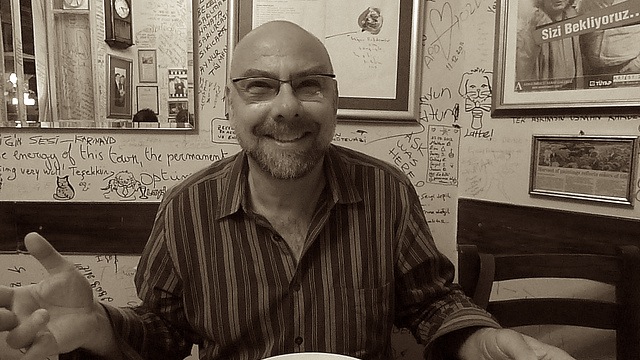
Chef Chris McDonald exploring the culinary world of Istanbul.
In the second of a new series we probe the memories and minds of some of the founding fathers and original influencers of Toronto’s restaurant scene.
This week we spend a few hours with Cava‘s Chef/Patron Chris McDonald. Chris has been behind the stoves of so many of this city’s memorable dining establishments, with a cursory scan of his resumé showing the immense depth and breadth of his decades of experience.
Ladies and gentlemen, Chef Chris McDonald…
Good Food Revolution: Hello Chris. Now how long have you been involved in Toronto’s hospitality industry and where did you get your start?
Chris McDonald: I got my start at the Bombay Bicycle Club, working as a busboy 40 years ago this year while going to high school. That was a lounge on the second floor of Julie’s Mansion which is now The Keg Mansion.
GFR: And how was it being a busboy? Do you have any particular memories of that time?
CM: As a teenage boy, it was great. The cocktail waitresses took a keen interest in my “education”.
GFR: And although this is a huge question, what are the most significant changes that you have seen in the dining scene over the decades?
CM: Going from Euro to local ingredients and going from Euro chefs to local guys.
Travelling by chefs and diners bringing a higher standard to town.
Ethnic food becoming more mainstream.
A better camaraderie among cooks.
Cooks learning “subsets” of cooking; butchery, gardening, general science and all the forms of fermentation like cheese, bread, pickles and charcuterie.
A certain “democracy” of restaurants being able to charge a fair price without being French or Italian for instance.
GFR: How do you feel about Toronto as a restaurant city? Do you feel as if we are world class in this department or do we still have some way to go?
CM: World class is a stupid expression and when it comes to culinary, world class requires an international travel and tourism base and so-called world class cities never refer to themselves as such. We work in a big fishbowl where less than 5% of our customers any given week are coming to us for a dining experience from out of province. It was no different at Avalon.
GFR: What with a number of New York Chefs opening outposts in our fair city, what do you think that this says about the evolution of our dining scene, and perhaps more poignantly global dining as a whole?
CM: I can only think of two. They are international stars who open in the cities where they see a market for their brands. I am happy to have Boulud in our city but it is quite unimportant in the big picture; at least for now.
GFR: Well, there was also Scott Conant with Scarpetta at The Thompson (which failed miserably), and there there is Barbuto’s Jonathan Waxman and his Montecito project scheduled to open soon.
CM: Thanks for the reminder. I think that somehow these companies buy the idea that we are a “world class city” and then are disappointed with the results.
GFR: Any thoughts why Conant’s take on higher end Italian didn’t fly with Toronto diners? Perhaps it was the $23 tomato and basil spaghetti?
CM: Never went. I was cooking Italian while he was in diapers.

Chef Chris McDonald back in 1984.
GFR: Message boards such as Chowhound often bemoan the lack of polished service in Toronto? Do you see any truth in this?
CM: Yes.
GFR: And why do you feel this to be the case?
CM: I want this to be a conspicuous and loaded one word answer…
GFR: What in your mind makes for good service?
CM: Anticipating guests’ needs and being prepared to execute. Having a kitchen and dining room that work well together and communicate well. I believe that this is crucial. I think that having been a waiter, busboy and bartender has made me a better cook, chef and “Patron”.
GFR: Over the years, where have you experienced the best service in Toronto?
CM: I am treated differently than the average customer because I am well known here. That being said, there are many well reviewed restaurants that don’t have the fundamentals of what I have mentioned above and so are unable to provide. I like the French word, “accueil”, which simply translates as “welcome” but means so much more.
Architects talk about the “entrance sequence” of a structure. I see accueil as a kind of entrance sequence for a restaurant. If, for instance you don’t have a coat check area in this climate, how can you welcome a guest?
To answer your question more specifically, both Chiado and Café Boulud have the tools and the professionalism to pull off great service.
GFR: Does the future of the independent restaurant in Toronto look bleak or blissful from you point of view?
CM: We will see how all the small restaurants recently opening on a budget will fare over the next few years. I hope that they succeed but the future looks bleak for independent operators unless there is a consumers’ shift in sensibilities that is in the opposite direction from the pernicious changes we have seen over the last decade.
GFR: Often this whole comfort food at less than comfortable (i.e. top dollar) prices worries me. Any thoughts on that?
CM: I hate the expression but understand the need. Comfort food for me is not what we see in Toronto restaurants and I didn’t spend 20 years leaning how to cook to sell Mac n Cheese
GFR: “No-shows” can be the death of a small establishment. What do you feel can be done (legally) to combat such situations?
CM: It’s not the death but hurts a lot. Again, we need a shift. Legally, I know that the situation is different in the US where the credit card companies stand behind the establishments with regards to “no-shows”.
GFR: So do you feel that a “no reservations” policy is a sensible solution for a smaller restaurant?
CM: I hate that as a diner. I feel it is “undemocratic” and runs contrary to the notion of hospitality. What if you are a 70 year old diner with a hip problem? Should you be expected to stand in line? It is generational and ageist and I hope that it gets a recalibration. How would you feel about a no reservation policy at Noma or Eigensinn Farm? We and our guests deserve a more civilized arrangement.
You go for a $10 haircut and you wait in line. For a $50 one, you want to be served right away. The issue is that a lot of these no reservation places charge about the same as the places that take them, check your coat, give you a linen napkin and accept your charge card. Now you got me started.
GFR: How do you feel the recent increase in minimum wage in Ontario impacts the restauranteur?
CM: Fine, but it will cause a necessary increase in prices at restaurants
GFR: Getting into the area of tips? Do you feel that serving staff should payout something to the house for breakages and the like? What do you feel is fair or are such expenses just a cost of doing business?
CM: There is a larger question to ask first. I will let you phrase it. The answer includes: Servers in North America are treated like soloists where they are paid below minimum wage, expected to be on call, work odd hours and earn the lions’ share of their income from tips.
In Europe, where the gratuity is often included in the menu prices, the front house staff are integrated more into the staff as a whole. They have been doing it for longer and have a better long term view. I don’t know if we could ever adopt their systems but I think that Chez Panisse is.
Your question only comes up as a result of the flawed system we work with.
GFR: On the subject of Toronto restaurant critics, do you feel that any are worth their salt?
CM: Sure! I guess so….
GFR: And how do you feel about the legitimacy of guides like Zagat and its ilk?
CM: I would like to think that Zagat was the original “people’s compendium” as they suggested that the reviews are based on an edited average of the write-in ratings. I guess they are OK. I like the idea of averaging the masses opinions. It becomes strange when you build a restaurant that is not for the average diner though. I suppose the “average diner” could gain some useful guidance with these. When was the last time you met someone who felt they were an average diner Jamie?
GFR: And then of course we have the democratization of food writing… food bloggers… where do you stand on this particular issue?
CM: Democratization is not the word I would use for these. Everyone is entitled to an opinion but the blogger with the greatest following is not necessarily the greatest at assessing a given restaurant.
GFR: It appears to me that Toronto goes through very obvious trends in its restaurants (tacos, bacon on and in everything, charcuterie)… I’d love to hear your thoughts on this topic?
CM: This is another indication that we are not world class.
GFR: You used the term this time!!!
And what, in your sage wisdom, do you predict for the future?
CM: Don’t be silly! I can say that over the last 20 years, you could have asked me that question and I would have something to predict. Now, the future is so uncertain. Molecular gastronomy has been integrated in our métier to the extent that each of us chooses how far we will go with it.
There seems to be a melding of food truck and restaurant cooking. I expect that will continue depending on how the bylaws fall.
Cocktail culture has moved from sophomoric to having a tiny niche which is where it belongs and that’s fine.
Good food requires wealth and, more importantly, a sense of security. The future of food, dining and hospitality depends largely on the economy.
GFR: Food Television has exploded over the past 10 years… how accurate a portrayal do you feel it paints of our industry?
CM: Jamie, you are getting me started again! How accurate was “Kitchen Confidential”? I don’t think that they are any more accurate than “Law and Order” was an accurate portrayal of the US justice system.
GFR: It’s not???
GFR: Canadian wines have come a long way since I arrived in Canada 17 years ago. Do you still feel that there is a resistance to them in some quarters? And why do you think that could be?
CM: At Cava, we feature Iberian wines as a complement to our food.
I have many friends in the Canadian wine industry and I also appreciate cool climate wines as much, if not more than hotter climate wines, but because we are trying to transport diners to Spain during their visit to Cava, they tend to order imported wine. There is always some resistance to local in certain quarters. That’s human nature.
GFR: Is there anything else you would like me to touch upon?
CM: Lots.
But I one thing is that I am surprised that sustainable ocean (wild) products is so not on the radar of so many here in Canada and the US. I love wild food but increasingly it is unavailable or unethical.
In my early decades, I saw wild terrestrial food become unavailable or “naughty”.
Now we have to take better care of our oceans. It hurts as a chef but it’s a reality that we all have to be aware of. Pristine farmed shellfish can be great but I haven’t quite become accustomed to fish that are farmed. I think we have some work to do in regards to sustainability and quality in this area.
GFR: Thank you for your time Chris!
…
 Edinburgh-born/Toronto-based Sommelier, consultant, writer, judge, and educator Jamie Drummond is the Director of Programs/Editor of Good Food Revolution… And he loves that 1984 picture of Chris. He’s also sorry for any typos but he is rather distracted being on “babywatch”.
Edinburgh-born/Toronto-based Sommelier, consultant, writer, judge, and educator Jamie Drummond is the Director of Programs/Editor of Good Food Revolution… And he loves that 1984 picture of Chris. He’s also sorry for any typos but he is rather distracted being on “babywatch”.



